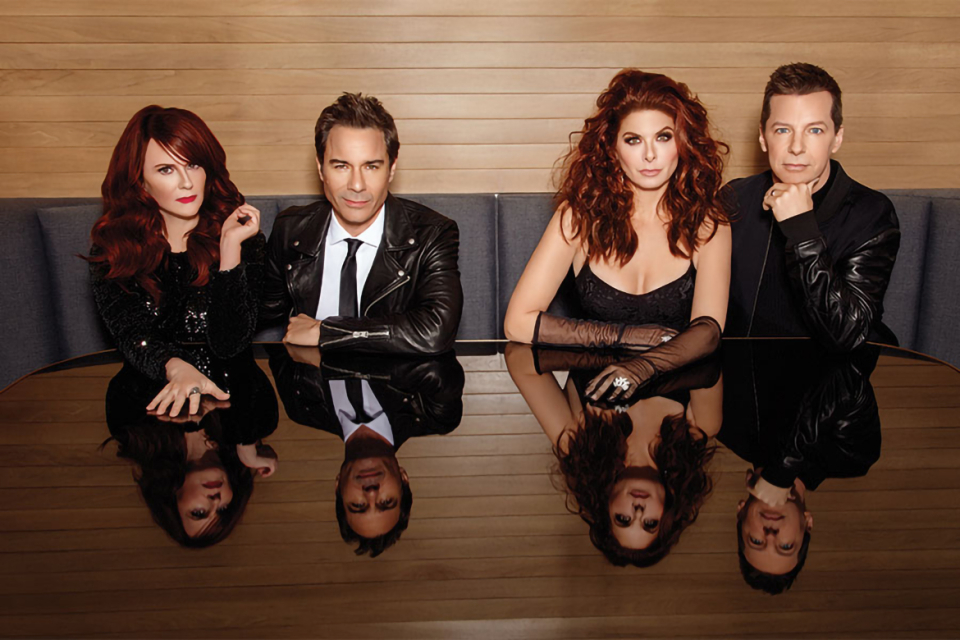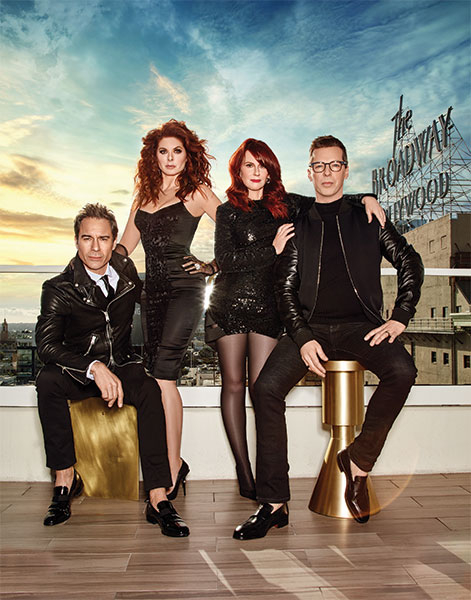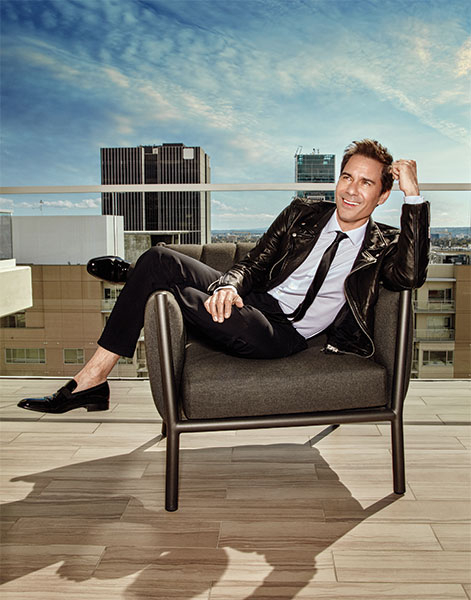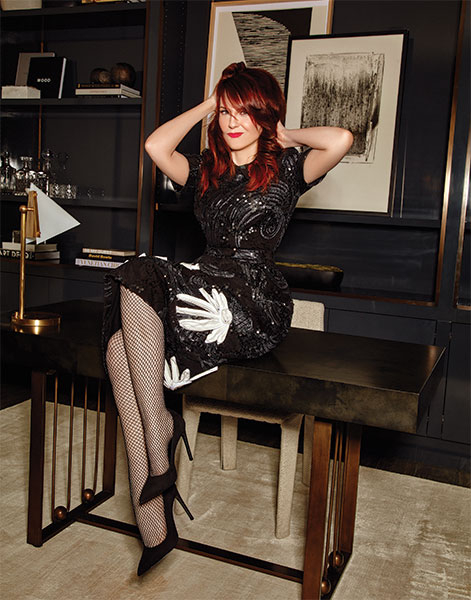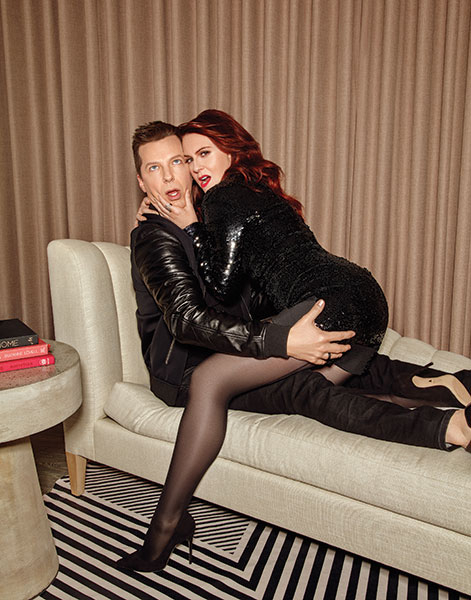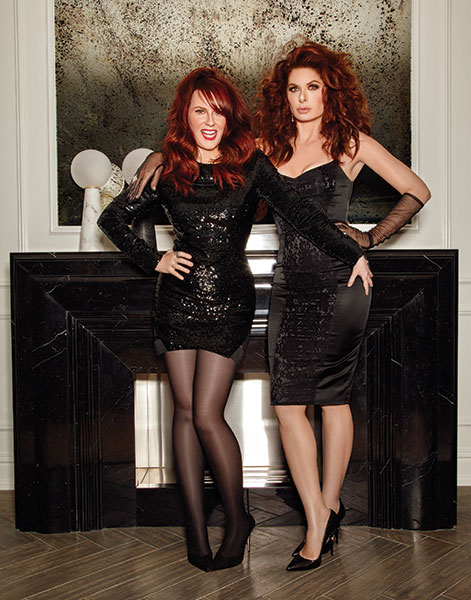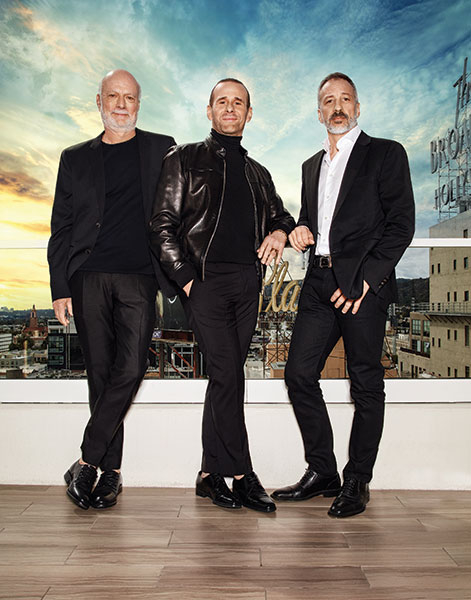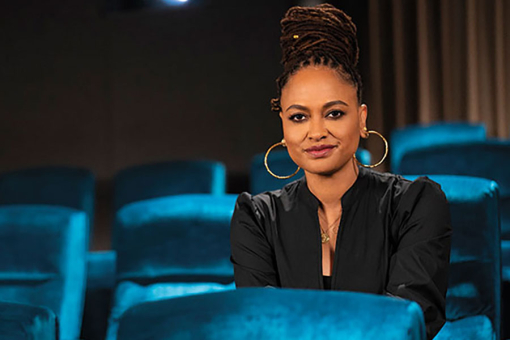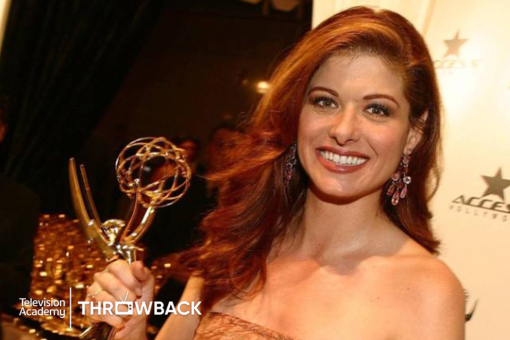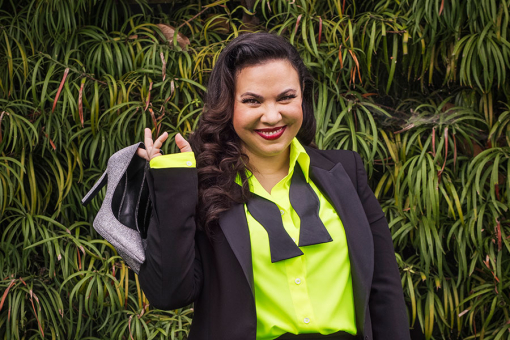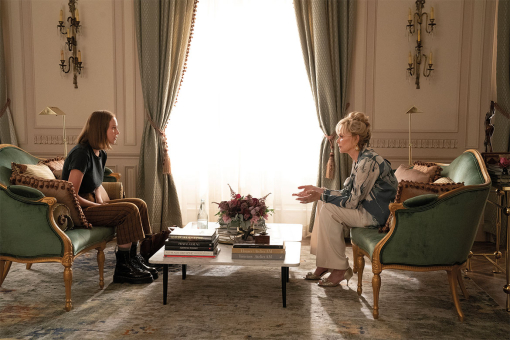The night of May 18, 2006 — when his hit series Will & Grace signed off after eight seasons on NBC — Max Mutchnick couldn't get to sleep.
So, naturally, he turned on the television. The Lucy Show was on. As Lucille Ball and Vivian Vance got trapped in a shower that was filling with water, he thought, How did we get through almost 200 episodes of this show and not do this scene? After all, Grace was a crazy redhead in the broad comic Lucy vein. He mentioned the idea to David Kohan — his co-creator and fellow executive producer — but it was too late to do anything about it.
For a decade, anyway.
With the 2017 reboot of Will & Grace came the chance to pay homage to that scene, when Karen (Megan Mullally) gets herself and Grace (Debra Messing) locked in a high-tech shower as it fills up. The women stayed in the tank all day, partly because climbing the ladder to get in and out, in heels, was too treacherous.
"So, we got pruney," Messing says.
Mullally adds: "Yeah, we hung out in the tank and floated around, and everybody came over and took selfies with us."
"Once you got 'em in the water, you had to leave 'em in the water," says director James Burrows, also one of the show's executive producers. "They were floating around there while we were rewriting. The only sad thing was, we couldn't do it in front of the audience. We had to preshoot."
"Just in case somebody drowned," Mullally quips.
How often does a series get a do-over years later? Well, with the impending return of Murphy Brown, Magnum, P.I., et cetera, apparently fairly often. But it was not that common when the Will & Grace cast and crew first thought of coming back in 2016. And their comeback was thanks to Donald Trump.
Like many people, Mutchnick was unnerved by the presidential campaign. At the same time, his alma mater, Emerson College, which had been displaying the Will & Grace set for a decade, needed to put it in storage during renovations. So, he got the gang together and put on a show in the old barn — the barn being a stylish Manhattan living room.
He and Kohan channeled the show's wit toward getting out the vote. Everyone was immediately on board. In the resulting #VoteHoney video, best friends Will Truman (Eric McCormack) and Grace Adler, with their cuckoo cohorts Jack McFarland (Sean Hayes) and Karen Walker, were back and as biting as ever as they fought over whom to support.
The response was ecstatic, racking up 7 million views. It may not have swayed the election, but it rang bells at NBC.
"We never in a million years [would have] thought there was going to be any life after our little get-out-the-vote video," Messing says. "We were so thrilled just to have the opportunity to get in the same room together, and to play together after 11 years."
The cast discussed the proposition over dinner at Hayes's house. "I'm the only one who doesn't live in Los Angeles and who's a single mom, so my logistical concerns were a huge consideration for me," Messing says, speaking by phone on her way to the airport and home to New York the day after the new season wrapped.
They all agreed that 10 episodes was a good, solid number. Then they had their first table read, and NBC Entertainment chairman Robert Greenblatt asked for 22 episodes — as well as another season. They compromised with 16 for season one (or season nine, if you count the first run). Season two (or 10) had a 13-episode commitment that was raised to 18, and they've already announced an 18-episode third (or 11th) season.
From the first time Messing and McCorMack read together in front of Mutchnick, Kohan and Burrows, they knew they were witnessing something special. "We looked at one another, like, 'Oh, my God, it's like Ted [Danson] and Shelley [Long]," Burrows says, referencing the stars of Cheers, a show he co-created. "You just know. They're taking a great script and making it extraordinary."
The connection is just as strong off-screen. "What the four of us went through 20 years ago, with the show taking off, and becoming household names together, that was a seismic life shift for all of us, and we went through it together," says Messing, whose son calls Burrows "Papa Jimmy."
Adds Hayes, in a voice a full octave lower than Jack's: "We were present when Debra gave birth to Roman, and when Eric had [his son] Finn. It's all intertwined, and we all know each other's secrets. Debra and Megan are my sisters, and Eric is my brother. We can't help but be in each other's lives, and it's a wonderful thing."
While they were too young and green in those early days to recognize how special the experience was, this time the gratitude is as palpable as the chemistry. "The fantasy for so many people is to relive the best parts of your youth," Hayes says. "In a way, this gift has been given to us, to go back in time and relive part of our younger years." He just has to do a bit more stretching this time around.
The creators didn't realize quite what they had before. "You just start a production, and you get four of the best people who've ever done it, and you get the best director that's ever done it, and you get an audience that responds to it, and you get an idea whose time has come," Kohan says. Easy, right? "Now, after being away from it all these years, you realize how rare it is to have all those things fall into place."
Messing also relishes being back on a multi-camera show shot before a studio audience — a sitcom rarity on television now.
"I did a single-camera comedy, and I loved it, but it uses different muscles," she explains. "There's more complexity to it. But what's funny in a single-camera comedy makes you giggle, makes you smile, but it doesn't often make you laugh out loud and guffaw. To have the opportunity to do [multi-camera] again is a gift, given the landscape of the industry."
Says McCormack: "I missed our routine. I love rehearsing, but I particularly love show night. We get to do a little play every week."
At a run-through earlier this year, the actors worked in sweats and sneakers; Messing wore a Will & Grace beanie. Still on book, they spoke quietly, with about half energy, but still got laughs from the scrum of executives who moved up and down the row of sets as they walked through the scenes.
Afterward, McCormack reminisced. "I realize now that near the end [of the first run], I didn't relish every moment," he says. "Now I do. During our run-through, I don't get on my phone when Megan and Sean are doing a scene. I want to see it."
At the subsequent taping, the first laugh wasn't for the actors. As Mutchnick and Kohan took their seats behind the monitors, Mutchnick called out, "Have a good show. We're listening and watching and judging." Maybe they were, but the live audience was simply enjoying.
Before the taping began, a sizzle reel from the show's first incarnation played on a large screen. Key moments unfolded, including Emmy wins. (The show received 16 Emmys, with Messing, McCormack and Hayes each winning once, Mullally twice, and Mutchnick, Kohan and Burrows honored as well, when the show was named outstanding comedy series in 2000.) Then the lights went down, the screen rose to reveal the four stars and the crowd went bananas.
Between takes, the writers huddled to punch up jokes, makeup artists touched up the actors, and the actors touched each other. Messing's hand rested casually on Hayes's butt while they heard the new lines. Suddenly, she laughed so loudly that the audience laughed back. Hayes waved at the crowd; McCormack took the mic from warm-up comedian Roger Lundblade (another returnee) and explained the scenes to come, because they were slightly out of order.
Burrows conducted it all with a gentle hand. "I would say it's about 70 percent the same people from before, if you're counting the entire crew," Mullally says. "So, there's this feeling that we never left, coupled with the fact that I feel like a miracle has occurred. It's really deep."
"I think we just needed a break," Hayes says. "It just happened that the break was 11 years."
In the intervening time, the actors worked on plenty of shows and Hayes became a super producer (Grimm, Hollywood Game Night).
McCormack was happy to put some distance between himself and the role he was known for. "I was so Will in my own eyes and the eyes of everyone else that I had to fight against that," he says. He's also starring in the Netflix drama Travelers, and he loves the combination. "I could come back to this without the kind of fear of, 'You know there's more to me than just Will.'"
A cavalcade of stars has returned to reprise their previous guest-starring roles, including Jennifer Lopez, Alec Baldwin, Blythe Danner, Molly Shannon and Harry Connick Jr.
Celebrities aren't just dropping by onscreen. Visitors to the taping included actor Steven Weber, an old friend of McCormack's, and Transparent creator Jill Soloway and her writers. Mullally's husband, Nick Offerman (Parks and Recreation), was on hand, giving her kisses between takes. The two met during season two, and he's been attending tapings ever since. "He's a part of this family," Mutchnick says.
Offerman landed a role on a recent episode, thanks to another storyline the writers always wanted to do about Will and Grace sleeping with the same guy. "We couldn't quite do that back then, and now we can," Kohan says.
Hayes's husband, Scott Icenogle, is always there as well, but then he's one of the show's composers (with Lior Rosner). Icenogle recalls attending tapings as a fan back when the show was first on the air. "I waved to Sean and Megan as they walked by." The couple met in 2006.
The new season finds the beloved quartet older and wiser, but just as wise-assed. Will and Grace go into business together, successfully. Jack has grown from child to man-child. Karen even manages to throw in an hour of work every week or so.
Their storylines reflect their growth: Will and Jack have the humbling experience of dating younger men. The group flashes back to 100 years ago, when things were far worse for gay men and the women who loved them. Karen grieves the loss of her maid and best friend, Rosario. "That's probably the meatiest episode that's ever been written for my character, and showed another side of Karen," Mullally says. "That was the softer side of Sears."
"I think, actually, that we're better than we've ever been," Messing says. "We're freer. Something happened in the passage of time that has made things richer all around. And I like that message."
She can't wait until menopause hits Grace. She envisions her character stepping into Barneys as if out of a rainstorm, "but she's actually having a hot flash. Any chance for Grace to be humiliated physically brings me joy. So, I'm always thinking, 'Okay, so we have the exploding water bra, what's the next thing?'"
Hayes finds the scripts stronger than ever. "Even if I weren't in it, I'd be, like, this is amazing writing. It's so clever and witty and sharp and surprising," he says. "It's so nice to go to a place of work where everybody cares so much." That's what you get with something old, something new, something Burrows and something blue.
"I often call the show a fairy tale, literally and figuratively," Burrows says. "There is an innocence in the four characters that they can say the meanest things and get away with it." He has directed every single episode of the series, plus the #VoteHoney video. The reason is simple. "It just really makes me laugh," he says, adding the obvious: "I don't have to do this anymore."
"Urban legend has it that Jimmy has a clause in his contract," Mullally says. "If it's not fun for him, he can bow out." He has no plans to stop. Neither does she. While the other actors are more circumspect about the show's future, for negotiation purposes, "being the consummate businesswoman that I am, I would do this for 25 more years," she says.
When the series began in 1998, its very log line — a gay man and a straight woman are best friends — was a political act. Today, for all the advances in LGBTQ rights, it still is.
"Marginalized people are more at risk today than they were when we were on 20 years ago," Messing asserts. "I needed assurances from Max and Dave that they weren't going to shy away from that. We weren't going to become a softer, kinder Will & Grace because of outside forces."
She needn't have worried. "David and I were never going to do it any other way than incorporating the times that we're living in," Mutchnick says. Just like they did before.
At the same time, everyone — audience, actors, creators — could use a break. "Since the election, I wake up every day feeling kind of ill at ease, and I look for a distraction that's going to make me feel comfortable and feel good," Kohan says. For a half hour each week, Will & Grace & Jack & Karen & company dish that out, and the audience is eating it up.
"We are comfort food," McCormack says. "And we're very proud of it."
Will & Grace is available on DVD and at NBC.com.
This article originally appeared in emmy magazine, Issue No. 7, 2018

